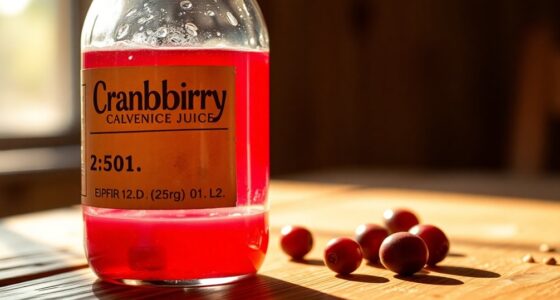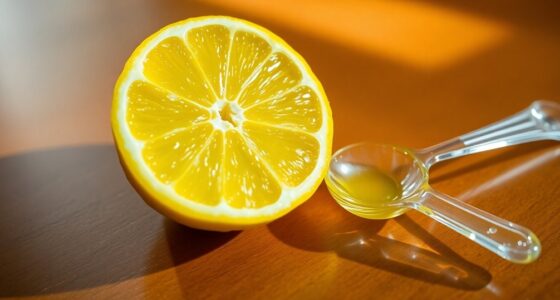Orange juice can safely sit out at room temperature for a maximum of two hours. If the temperature exceeds 90°F, you should only leave it out for one hour. After these time limits, harmful bacteria can start to grow, making the juice unsafe to drink. Always remember to check for any signs of spoilage like off smells or visible mold. Want to know more about keeping your juice fresh? There's plenty more to learn!
Key Takeaways
- Orange juice can safely sit out for up to two hours at room temperature.
- If temperatures exceed 90°F, do not leave juice out for more than one hour.
- Freshly squeezed juice spoils faster than pasteurized juice, requiring more caution.
- Always check for spoilage signs like an unpleasant smell, off taste, or visible mold before consuming.
- Discard any juice left out longer than the recommended time to avoid health risks.

Have you ever wondered how long orange juice can safely sit out? It's a common question, especially when you're enjoying a refreshing glass of juice and lose track of time. The answer isn't as simple as you might think, as it largely depends on factors like the type of juice and the surrounding temperature.
For instance, if you leave your orange juice out at room temperature, it's best to keep it to a maximum of two hours. Beyond that point, harmful bacteria can start to multiply, leading to spoilage and making your food unsafe to consume.
If the temperature exceeds 90°F, you'll need to be even more cautious. In this case, orange juice should be discarded if left unrefrigerated for more than one hour. High temperatures accelerate the growth of bacteria, which can turn your delicious juice into a breeding ground for foodborne illnesses. Nobody wants to ruin their day with a nasty stomach bug from something as simple as leaving juice out too long.
Freshly squeezed orange juice is particularly at risk. While it's undoubtedly delicious and packed with nutrients, it also has a shorter shelf life compared to pasteurized versions. If you leave freshly squeezed juice out for an extended period, it's safer to err on the side of caution and toss it.
The same goes for any juice that shows signs of spoilage. You might notice an unpleasant smell, an off taste, bloated packaging, or even visible mold or sediments. These are all clear indicators that your juice has gone bad.
When it comes to pasteurized orange juice, you've got a bit more flexibility. If you accidentally leave it out for less than two hours, you can safely return it to the refrigerator, provided the container is still unopened.
This pasteurization process kills most harmful bacteria, giving it a longer shelf life compared to fresh juice. However, it's still essential to monitor the temperature and any signs of spoilage before consuming it again.
Frequently Asked Questions
Will Orange Juice Go Bad if Left Out?
Yes, orange juice can go bad if you leave it out. Bacteria thrive in warm environments, so the longer it sits at room temperature, the higher the risk of spoilage.
You'll notice signs like a bloated container, sour smell, or an off-taste. If it's fresh-squeezed, it's especially sensitive and should be discarded quickly.
Always check for these indicators to ensure you don't consume spoiled juice. Stay safe and enjoy your juice fresh!
Can I Drink Orange Juice After 4 Hours?
You really shouldn't drink orange juice after it's been left out for 4 hours.
By that point, it's at a high risk of spoilage, which can lead to foodborne illnesses. Even store-bought juice can develop off-flavors and bacteria if it sits too long.
To stay safe, it's best to discard any juice that's been unrefrigerated for that duration. Your health's not worth the risk! Always refrigerate your juice promptly.
How Long Does It Take Orange Juice to Spoil?
Orange juice can spoil relatively quickly, especially if it's fresh-squeezed.
Typically, you'll notice signs of spoilage within a few hours at room temperature. Look out for an unpleasant smell, off taste, or visible mold.
If it's pasteurized and unopened, it might last a bit longer, but once opened, don't take chances.
If you're ever in doubt, it's better to err on the side of caution and dispose of it.
What Happens if I Don't Refrigerate Juice After Opening?
If you don't refrigerate juice after opening, you risk spoiling it.
Bacteria can grow rapidly, especially if it's been left out for over two hours. Even if it looks and smells fine, the quality may decline, leading to off-flavors and potential health risks.
You should always store opened juice in the fridge to enjoy its freshness and avoid any foodborne illnesses. Keeping it cold is your best bet for safety.
Conclusion
In the dance of freshness, orange juice should never linger in the warmth for more than two hours. After that, it begins to lose its vibrant zest, like a sunset fading into night. Trust your senses; if it starts to smell off or looks cloudy, it's time to say goodbye. Keep your juice in the fridge, where it can stay cool and refreshing, just like a gentle breeze on a hot summer day.
Cindy thoroughly researches juicing trends, techniques, and recipes to provide readers with practical advice and inspiration. Her writing style is accessible, engaging, and designed to make complex concepts easy to understand. Cindy’s dedication to promoting the advantages of juicing shines through her work, empowering readers to make positive changes in their lives through the simple act of juicing.











